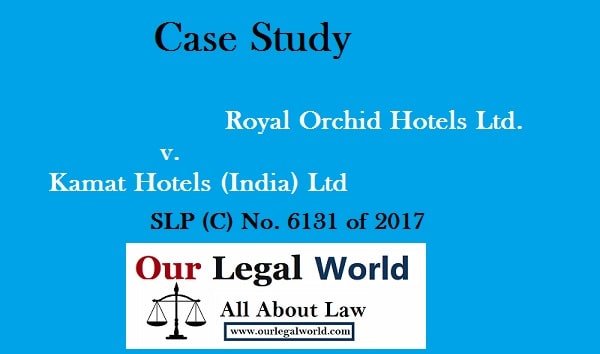Royal Orchid Hotels Ltd. v. Kamat Hotels (India) Ltd: Case Study
Court: Supreme Court of India Case No: SLP (C) No. 6131 of 2017 Order dated: 14th December, 2017 Bench: RANJAN GOGOI, J. and R. BANUMATHI, J.
FACT
The Petitioner in present case, ‘Royal Orchid Hotels Ltd.’ has obtained registration of its trademarks ‘Royal Orchid’ and ‘Royal Orchid Hotels’ in class 16 under Trademark Act, 1999 in the year 2005. The Kamat Hotels (India) Ltd. (hereinafter referred to as ‘Respondent No.1’ challenged such registration.
The Deputy Registrar rejected the Petitioner’s applications for registration of the marks ‘ROYAL ORCHID’ and ‘ROYAL ORCHID HOTELS’ in class 42. The Registrar, after a careful consideration of the evidence submitted, concluded that the Respondent was prior user of the mark ‘ORCHID’, and since ‘ORCHID’ is the only registrable part of the Petitioner’s trademarks, the rival marks are confusingly similar.
Later, IPAB reversed the order of the Deputy Registrar on two grounds. Firstly, it observed that although the Respondent has claimed use of its mark ORCHID since 1997, the Registrar of Companies had given his approval for the name of the Petitioner’s company ‘Royal Orchid Hotels Private Limited’ in 1996. Thus, it cannot be said that the adoption of the Petitioner’s mark is dishonest. Secondly, on the premise of ‘anti-dissection rule’, the Petitioner’s marks were held to be dissimilar to the Respondent’s mark ‘ORCHID’. It was held that since the class of consumers would be of high income group, any chance of confusion between the rival marks is unlikely.
Also Read: Glenmark Pharmaceuticals Ltd. v. Curetech Skincare and Galpha Laboratories Ltd.
The Respondent then approached the High Court of Madras by way of Writ Petition Nos. 26544-26545 of 2011, which were also dismissed by the High Court on February 07, 2014. The apex had dismissed the Special Leave Petition against the order of the High Court on September 09, 2014. Thus, the dispute with regard to the registration of the trademarks “Royal Orchid” and “Royal Orchid Hotels” in Class 16 attained finality in law.
A reading of the order of the Deputy Registrar dated June 29, 2009 showed that the refusal of registration of trademark, ‘Royal Orchid’ in Class 42 (Trademark Act 1999) to the Petitioner was issued on a consideration of evidence and materials placed before the Authority, on such consideration the Deputy Registrar of Trademarks came to the conclusion that the Petitioner was not the first user of the logo/mark “Royal Orchid” and in fact logo/mark ‘Orchid’ was being used by Respondent no. 1 from an anterior date.
The Deputy Registrar also took into consideration the similarity in the two logo/mark in refusing registration to the Petitioner. The Intellectual Property Appellate Board in appeal had reversed the aforesaid refusal of registration on the ground that the Petitioner-Company had been incorporated as ‘Royal Orchid Hotels Limited’ after affecting a change of its name in 1997 pursuant to the company’s resolution dated September 30, 1996, which is prior in point of time to use of the mark of Respondent no. 1.
The IPAB was also of the view that no confusion is likely to be caused by use of two logos/marks i.e. ‘Royal Orchid Hotels Limited’ and ‘Orchid’ respectively. On this additional ground also, the Petitioner claimed for registration in Class 42 was allowed by the IPAB.
Issue:
(1)Whether the adoption of the mark ‘ORCHID’ by the Petitionerwas dishonest?
(2)Weather the use of the mark ‘ORCHID’ by the Petitioner will cause confusion in the mind of consumers?
Held
The dispute between parties, which commenced as an opposition proceeding before the Trade Marks Registry, has finally come to an end after the Supreme Court recently dismissed the Special Leave Petition in favour of the Respondent in a case revolving around the trademark ‘ORCHID’.
The conclusion that the Petitioner had not demonstrated that it is the Respondent no. 1 who is the first user of the trademark. The apex also did not find any fault in the understanding and the decision on that basis is that there was no inhibition in deciding the rival claims as far as registration in Class 42 is concerned.
Thus, the apex court while dismissing the Petition held that having considered the matter and the conclusions reached by the High Court cannot be said to be, in anyway, unreasonable and/or unacceptable. Rather, the Hon’ble Supreme Court held that the view recorded by the High Court is a perfectly possible and justified in view of the matter and the conclusion(s) reached can reasonably flow from a balanced consideration of the evidence and materials on record. The hon’ble Supreme court held that it will, therefore, not consider the present to be a fit case for interference with the order of the High Court’.
SLP Dismissed






![Tax Law Internship at Legum Attorney [Chamber of Ashish Panday], Delhi : Apply by 15th May 2025](https://www.ourlegalworld.com/wp-content/uploads/2025/05/IMG_0113-min.png)

